Ali Boukeroui 8 min read
10 Best Books For Indie Hackers
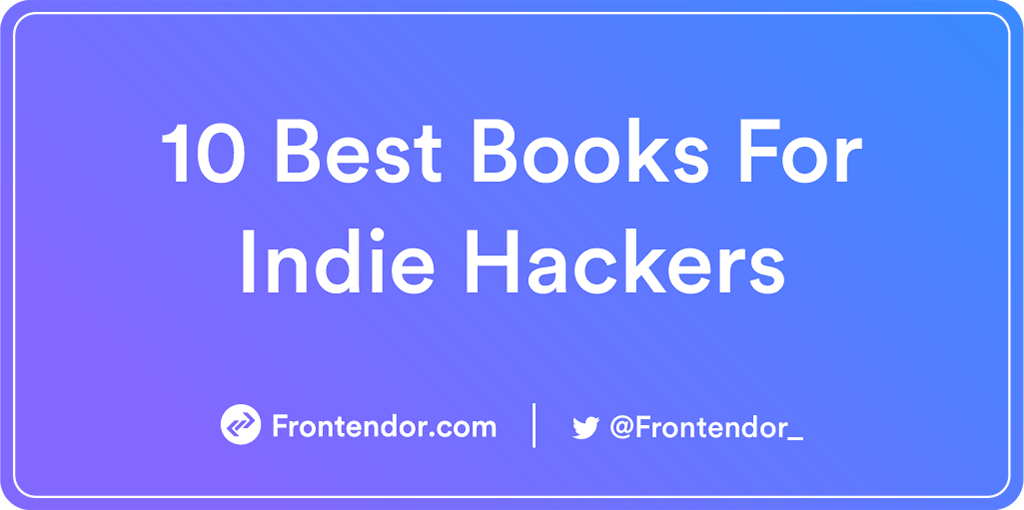
I have asked more than a dozen indie hackers for one book each he found to be important for a successful business. See their answers below.
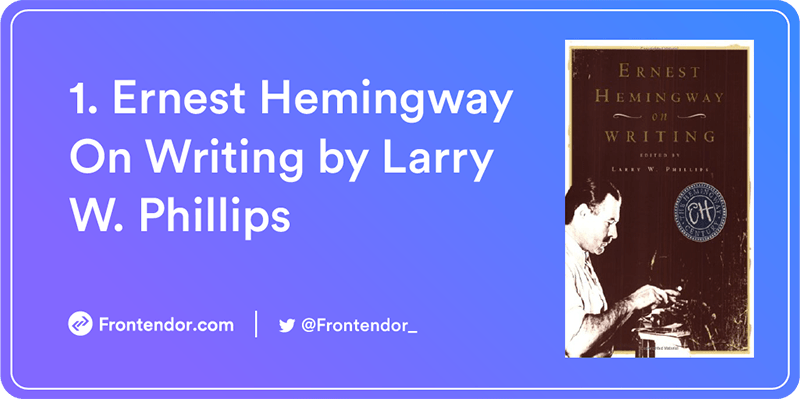
1. Ernest Hemingway On Writing by Larry W. Phillips
An assemblage of reflections on the nature of writing and the writer from one the greatest American writers of the twentieth century.
Throughout Hemingway’s career as a writer, he maintained that it was bad luck to talk about writing—that it takes off “whatever butterflies have on their wings and the arrangement of hawk’s feathers if you show it or talk about it.”
- 📕 Recommended by 👤 Tyler Tringas, the founder of Storemapper (acquired by SureSwift Capital) and Earnest Capital
This is strange but I found Ernest Hemingway On Writing - an organized collection of quotes and books by Ernest Hemingway on writing work - to be very helpful. Writing a novel and often being a paid writer seems to have the same tone as building a great software product/company and being a bootstrapper in general.
My favorite tip is to stop each day when you are doing well. Writing a novel and building a business is about maintaining momentum over weeks, months, and years. Another way to keep that motivation loop strong is to get to a point where you know exactly what to do next, then stop for a day, get as far away from work as possible (read, go out, have dinner with friends) and move on to the next day. This way you will never start your day by saying "what am I doing now?" You always have one high-value thing to kick off the day with.
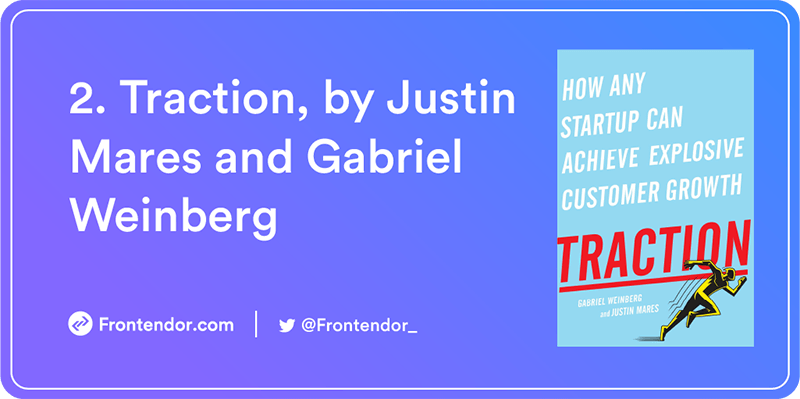
2. Traction, by Justin Mares and Gabriel Weinberg
I hate business books telling you the same thing over and over again. Traction is the opposite. There is no fluff. It’s all been edited away. Beyond these 78 takeaways there are probably 500 more actionable tactics and insights you can use across all 19 traction channels.
- 📗Recommended by 👤 Cory Zue, the founder of SaaS Pegasus ($900/mo) and Place Card Me ($2,200/mo)
The great thing I have taken from Traction is that founders should try to divide their time equally between product creation and marketing. For many developers and Indie Hackers, this balance is very much on the construction site, which is where most of us are comfortable. But by trying to achieve the 50/50 divergence I ended up investing a lot of energy and energy in promoting my projects, which ultimately led to greater success than I would have achieved if I had followed my emotions and focused only on construction. Now I always divide the time I spend on projects into these two buckets of time and the right course when I find that I have spent the most time building.
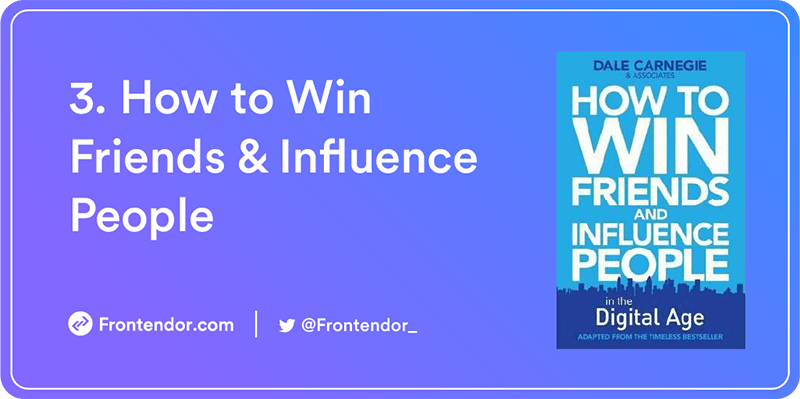
3. How to Win Friends and Influence People by Dale Carnegie
For more than sixty years the rock-solid, time-tested advice in this book has carried thousands of now-famous people up the ladder of success in their business and personal lives. Now this previously revised and updated bestseller is available in trade paperback for the first time to help you achieve your maximum potential throughout the next century!
- 📘Recommended by 👤Tracy Osborn, Founder of Hello Web Books ($1,000/mo) and WeddingLovely ($7,200/mo)
A lot of books come and go with me but this one has a permanent place on my shelf all the time. As someone who has to spend a lot of time communicating, it has been an important resource.
It made me think a lot about the possible answers to what I was saying, and it helped me wait for the answers to the statements so I could do something that works for my audience. I use it a lot when I ask questions (for example, at TinySeed I do a lot of emails asking for advice from our founders - I need to ask for help with confidence, but also represent our advisors and their schedules) and I wouldn't want to work effectively if I hadn't read this book first.
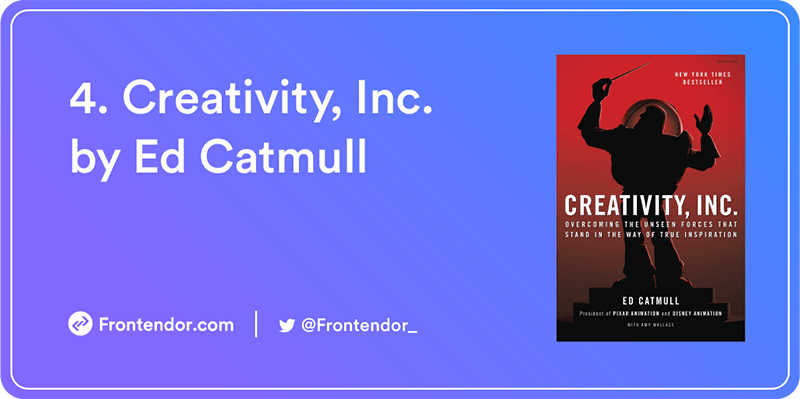
4. Creativity, Inc. by Ed Catmull
From a co-founder of Pixar Animation Studios—the Academy Award–winning studio behind Coco, Inside Out, and Toy Story—comes an incisive book about creativity in business and leadership for readers of Daniel Pink, Tom Peters, and Chip and Dan Heath.
- 📘 Recommended by 👤Nelson Joyce, the co-founder of Tettra ($57,000/mo)
The best advice from Ed Catmull, the co-founder of Pixar is that if you are a successful person, It's easy to imagine that you know what contributed to that success.
In fact, there are countless ways to determine which ones are truly important. To make a good movie, studios have to start all over again. Every movie starts badly, and then they make it better over time with constant improvement!
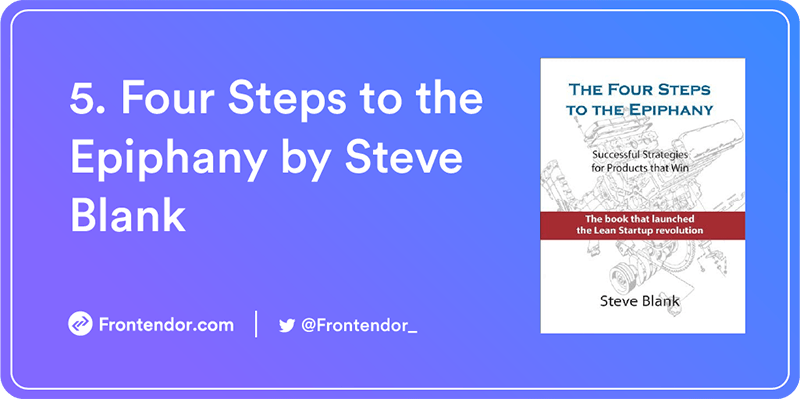
5. Four Steps to the Epiphany by Steve Blank
The book offers the practical and proven four-step Customer Development process for search and offers insight into what makes some startups successful and leaves others selling off their furniture. Rather than blindly execute a plan, The Four Steps helps uncover flaws in product and business plans and correct them before they become costly. Rapid iteration, customer feedback, testing your assumptions are all explained in this book.
- 📕 Recommended by 👤 Wade Foster, the founder of Zapier
I studied "Four Steps at Epiphany" right out of college and it completely changed the way I thought about business. I grew up in a traditional town with no tone of business exposure. So to me, the idea of starting a business was like an act of witchcraft.
The four steps gave me a framework for thinking about validating ideas and how to apply your approach to a vision that could be the basis of a business. It gave me a lot of confidence to try and try something commercial.
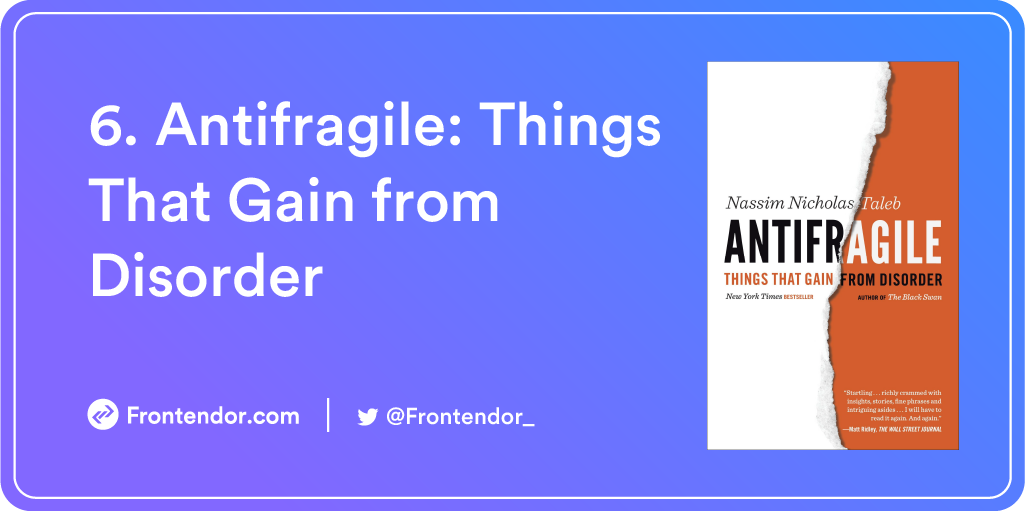
6. Antifragile: Things That Gain from Disorder by Nassim Taleb
Antifragile is a standalone book in Nassim Nicholas Taleb’s landmark Incerto series, an investigation of opacity, luck, uncertainty, probability, human error, risk, and decision-making in a world we don’t understand. The other books in the series are Fooled by Randomness, The Black Swan, Skin in the Game, and The Bed of Procrustes.
- 📗 Recommended by 👤 Nat Eliason, the founder of Growth Machine
Surprisingly this is not being talked about yet, but Antifragile by Nassim Taleb. It has been helpful to force me to think that it could be critical to my business. One of the biggest keys to success, especially for a bootie company, is simply not to die, and one of the biggest ways you die is by a surprisingly unpredictable weakness.
I try to re-read it every year anyway because I often find something new and relevant to any of the problems I am experiencing at the time.
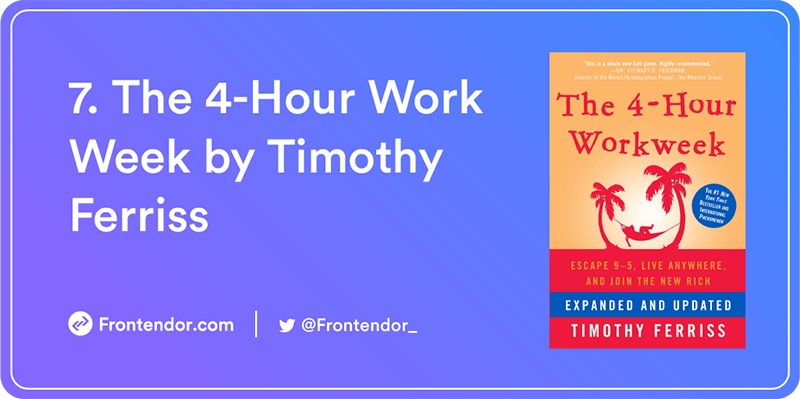
7. The 4-Hour Work Week by Timothy Ferriss
Forget the old concepts of retirement and a deferred life plan. There is no need to wait and every reason not to, especially in unpredictable economic times. For living more and working less, this book is the blueprint.
- 📗 Recommended by 👤 Katie Keith, the co-founder of Barn2 Media ($50,000/mo)
I found the 4-hour Working Week by Timothy Ferriss significant for a number of reasons. For example, this book has taught me that it is important to choose a diversified business model that suits your lifestyle, which is one reason why we have made a difference in Barn2's website (i.e. providing services) to selling WordPress plugins (i.e. selling products), which is very repetitive and awesome. We realized that the work we were doing would never meet our goals.
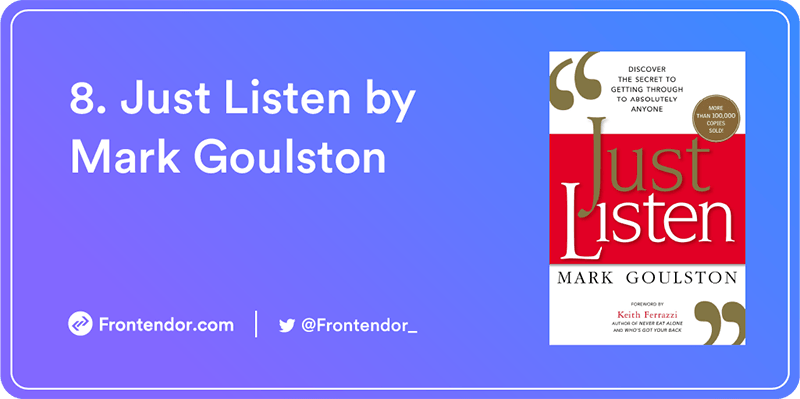
8. Just Listen by Mark Goulston
Getting through to someone is a fine art, indeed, but a critical one nonetheless. Whether you are dealing with a harried colleague, a stressed-out client, or an insecure spouse, things will go from bad to worse if you can't break through emotional barricades and get your message thoroughly communicated and registered.
- 📘 Recommended by 👤 Alex Hillman, a co-founder of 30x500 ($53,000/mo)
I re-read, reference, and recommend Just Listen by Mark Goulston, very great book. The author is a psychiatrist who is best known as a leading trainer in negotiating FBI kidnappings. It’s not explicitly about business (even though it has clear contexts in the negotiations), but it’s about people’s mental performance in the context of why we don’t really listen, or think we do.
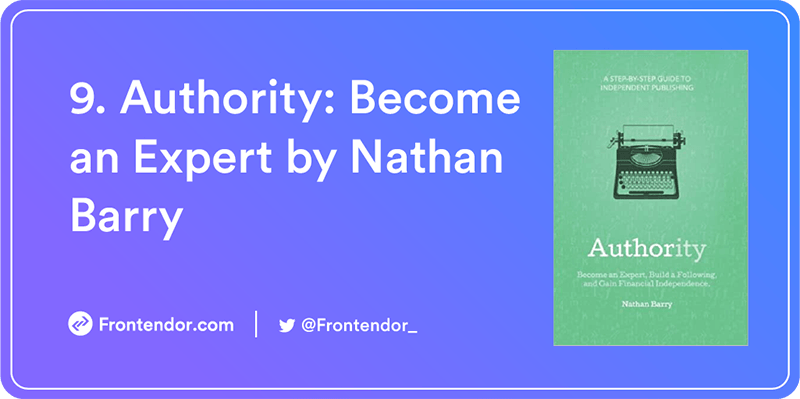
9. Authority: Become an Expert and Gain Financial Independence by Nathan Barry
Taking notes on Authority: A step-by-step guide to independent publishing; Become an Expert, Build a Following, and Gain Financial Independence, by Nathan Barry to discover self-publishing secrets to success.
- 📗 Recommended by 👤 Adam Wathan, the founder of Tailwind CSS and Full Stack Radio
I have read Nathan's work carefully by reading all of his blog posts, listening to all his podcast episodes, and listening to many conversations, and watching lectures by other creators I have read about his work, and I can confidently say no I can actually be a full-time creator right now without what I have learned from those resources. I have now earned over $ 2 million by selling my products and have all the time and freedom I can ask to explore new ideas and start building anything that will follow.
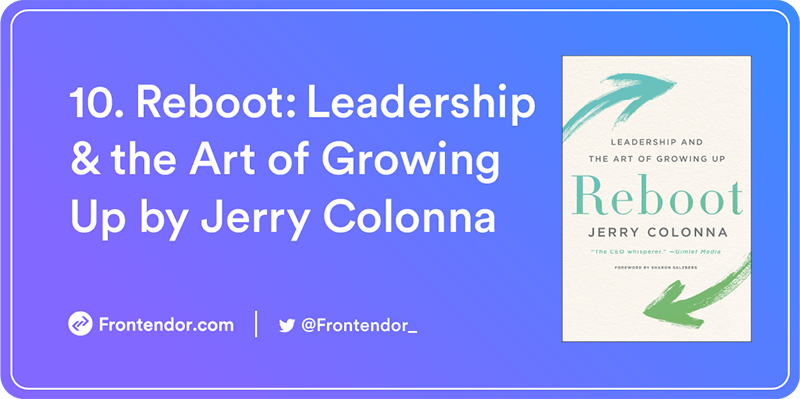
10. Reboot: Leadership and the Art of Growing Up by Jerry Colonna
One of the start-up world’s most in-demand executive coaches—hailed as the “CEO Whisperer” (Gimlet Media)—reveals why radical self-inquiry is critical to professional success and healthy relationships in all realms of life.
- 📕 Recommended by 👤 Paul Jarvis, the founder of PJRVS ($33,000/mo)
Reboot by Jerry Colonna. To be good leader, we need to unpack our belongings and understand them better. A lot of work is a relationship, so learning and navigating those ultimately helps us do a better job.
Jerry is a real deal. Part pragmatic, part of Eastern Philosophy, this book is a great mix of clear stories and actions that you can work on in your life.

